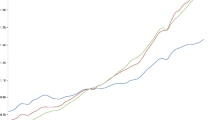Abstract
Mainstream enterprises function by alleviating the cognitive burdens on their members and hence generating an insensitivity to all those complex environmental factors, in which they critically depend. By focusing on the political, institutional dynamics, the present article dwells on the questions of: How can social enterprises regain the embeddedness to the political, institutional environment and how can this process quest the dominant, institutional closure? To address these questions, the article introduces a synergy between new institutionalism and systems theory, both macro-sociological approaches that can compensate for each other’s deficiencies. In this context, the hybrid concept of institutional entrepreneurship describes the institutionalization of new organizational forms via the embeddedness of the institutional logics that underpin them. An in-depth qualitative research of the OTELO social enterprise and of its institutional framework of Mühlviertel was conducted. Empirical evidence shows that social entrepreneurship can regain the institutionally sustainability by becoming embedded to the fields of legitimacy, politics and discourse, and through this process dispute the broader institutional closeness.
Similar content being viewed by others
Notes
For more see theoretical outline.
For more see https://www.leader.at/ueberblick.html.
References
Agafonow, A. (2015). Value creation, value capture, and value devolution: Where do social enterprises stand? Administration and Society,47(8), 1038–1060.
Bacq, S., & Janssen, F. (2011). The multiple faces of social entrepreneurship: A review of definitional issues based on geographical and thematic criteria. Entrepreneurship & Regional Development,23(5–6), 373–403.
Beckert, J. (1999). Agency, entrepreneurs, and institutional change. The role of strategic choice and institutionalized practices in organizations. Organizations Studies,20, 777–799.
Bertalanffy, L. V. (1968). General system theory: Foundations, development, applications. New York: George Braziller.
Blyth, M. (2001). The transformation of the Swedish model: Economic ideas, distributional conflict, and institutional change. World Politics,54(1), 1–26.
Boli, J., & Thomas, G. M. (1997). World culture in the world polity: A century of international non-governmental organization. American Sociological Review,62, 171–190.
Carvalho, A., Cunha, S. K., Lima, L. F., & Carstnes, D. D. (2017). The role and contributions of sociological institutional theory to the socio-technical approach to innovation theory. RAI Revista de Administração e Inovação,14(3), 250–259.
Catt, H., & Murphy, M. (2003). Sub-state nationalism. A comparative analysis of institutional change. Nations and Nationalism,9(3), 451–452.
Cohen, M., March, J. G., & Olsen, J. P. (1972). A garbage can model of organizational choice. Administrative Science Quarterly,17, 1–25.
Cortell, A. P., & Peterson, S. (1999). Altered states: Explaining domestic institutional change. British Journal of Political Science,29(1), 177–203.
Daft, R. L., & Lewin, A. Y. (1993). Where are the theories for the “new” organizational forms? An editorial essay. Organization Science,2(4), i–iv.
Dennis, R. Y., & Choony, K. (2015). Can social enterprises remain sustainable and mission focused? Applying resiliency theory. Social Enterprise Journal,11(3), 233–259.
Derma, K. (2018). Mühlviertel region interviews. Interview by Chatzichristos Georgios.
Dies, D. (2018). Mühlviertel region interviews. Interview by Chatzichristos Georgios.
DiMaggio, P. (1988). Interest and agency in institutional theory. In L. Zucker (Ed.), Institutional patterns and culture (pp. 3–22). Cambridge: Ballinger Publishing Company.
Dowding, K. (1994). The compatibility of behaviouralism, rational choice and “new institutionalism”. Journal of Theoretical Politics,6(1), 105–117.
Fischler, R. (2000). Communicative planning theory: A Foucauldian assessment. Journal of Planning Education and Research,19, 358–368.
Gaglio, C. M. (2004). The role of mental simulations and counterfactual thinking in the opportunity identification process. Entrepreneurship Theory Practice,28, 533–552.
Garud, R., Jain, S., & Kumaraswamy, A. (2002). Institutional entrepreneurship in the sponsorship of common technological standards: The case of Sun Microsystems and Java. The Academy of Management Jounal,45, 196–214.
González, S., & Healey, P. (2005). A sociological institutionalist approach to the study of innovation in governance capacity. Urban Studies,42(11), 2055–2069.
Greenwood, R., Diaz, A., Lin, S., & Lorente, J. C. (2010). The multiplicity of institutional logics and the heterogeneity of organizational responses. Organization Science,21(2), 521–539.
Griwern, S. (2018). Mühlviertel region interviews. Interview by Chatzichristos Georgios.
Grubinger, N. (2018). Mühlviertel region interviews. Interview by Chatzichristos Georgios.
Hajer, M. (1995). The politics of environmental discourse. Oxford: Oxford University Press.
Hasse, R. (2005). Luhmann’s systems theory and the new institutionalism. In K. H. Becker & D. Seidl (Eds.), Niklas Luhmann and organization studies (pp. 248–261). Copenhagen: Copenhagen Business School Press.
Jenner, P. (2016). Social enterprise sustainability revisited: An international perspective. Social Enterprise Journal,12(1), 42–60.
Jensen, O., & Richardson, T. (2000). Discourses of mobility and polycentric development: A contested view of European spatial planning. European Planning Studies,8, 503–520.
Jessop, B. (1990). State theory: Putting the capitalist state in its place. Cambridge: Polity Press.
Korbe, G. (2018). Mühlviertel region interviews. Interview by Chatzichristos Georgios.
Korfer, N. (2018). Mühlviertel region interviews. Interview by Chatzichristos Georgios.
Kral, D. (2018). Mühlviertel region interviews. Interview by Chatzichristos Georgios.
Lavrakas, P. J. (2008). Encyclopedia of survey research methods. Thousand Oaks: Sage Publications. https://doi.org/10.4135/9781412963947.
Levy, D., & Scully, M. (2007). The institutional entrepreneur as modern prince: The strategic face of power in contested fields. Organizations Studies,28, 971–991.
Luhmann, N. (1964). Funktionen und folgen formaler organisation. Berlin: Duncker & Humblot.
Luhmann, N. (2012). Theory of society. Stanford: Stanford University Press.
Maguire, S., Hardy, C., & Lawrence, T. B. (2004). Institutional entrepreneurship in emerging fields: HIV/AIDS treatment advocacy in Canada. The Academy of Management Journal,47, 657–679.
Maill, D. (2018). Mühlviertel region interviews. Interview by Chatzichristos Georgios.
Meyer, J. W., Boli, J., & Thomas, G. M. (1994). Ontology and rationalization in the western cultural account. In W. R. Scott & J. W. Meyer (Eds.), Institutional environments and organizations: Structural complexity and individualism (pp. 9–26). Thousand Oaks: Sage.
Monetz, M. (2018). Mühlviertel region interviews. Interview by Chatzichristos Georgios.
Peters, B. G. (2012). Institutional theory in political science. London: Continuum.
Pierson, P., & Skocpol, T. (2002). Historical institutionalism in contemporary political science. In I. Katznelson & H. V. Milner (Eds.), Political science: State of the discipline (pp. 693–721). New York: W.W. Norton.
Powell, W. W., & DiMaggio, P. J. (1991). The new institutionalism in organizational analysis. Chicago: The University Chicago Press.
Romanelli, E. (1991). The evolution of new organizational forms. Annual Review of Sociology,17, 79–103.
Roth, S. (2017). Parsons, Luhmann, Spencer Brown. NOR design for double contingency tables. Kybernetes,46(8), 1469–1482.
Schneider, L. W. (2009). Grundlagen der soziologischen theorie (p. 2). Wiesbaden: VS Verlag für Sozialwissenschaften.
Scott, W. R. (1995). Institutions and organizations. Thousand Oaks: Sage.
Seo, M. G., & Creed, W. E. D. (2002). Institutional contradictions, praxis and institutional change: A dialectic perspective. Academy of Management Review,27, 222–248.
Simon, H. (1983). Reason in human affairs. Stanford: Stanford University Press.
Smith, B. R., & Stevens, C. E. (2010). Different types of social entrepreneurship: The role of geography and embeddedness on the measurement and scaling of social value. Entrepreneurship & Regional Development,22(6), 575–598.
Somerville, P., & McElwee, G. (2011). Situating community enterprise: A theoretical exploration. Entrepreneurship & Regional Development,23(5–6), 317–330.
Steyaert, C., & Katz, J. (2004). Reclaiming the space of entrepreneurship in society: Geographical, discursive and social dimensions. Entrepreneurship and Regional Development,16(3), 179–196.
Strang, D., & Sine, D. W. (2002). Interorganizational institutions. In J. A. C. Baum (Ed.), The Blackwell companion to organizations (pp. 497–519). Oxford: Blackwell.
Suchman, M. C. (1995). Managing legitimacy: Strategic and institutional approaches. Academy of Management Review,20, 571–610.
Suddaby, R., & Greenwood, R. (2005). Rhetorical strategies of legitimacy. Administrative Science Quarterly,50, 35–67.
Tarrow, O. (1994). Power in movement. Cambridge: Cambridge University Press.
Thompson, S. P. (2014). Is the Mondragon cooperative experience a cultural exception? The application of the Mondragon model in Valencia and Beyond. Journal of Co-Operative Studies,47(3), 19–33.
Thompson, S. P. (2015). Towards a social theory of the firm: Worker cooperatives reconsidered. Journal of Co-Operative Organization and Management,3(1), 3–13.
Thompson, S. P. (2016). Worker cooperatives in the theory of the firm: Marx and Veblen on technological determinism. Journal of Economic Issues,50(4), 913–939.
Thompson, S. P., & Valentinov, V. (2017). The neglect of society in the theory of the firm: A systems theory perspective. Cambridge Journal of Economics,41(4), 1061–1085.
Torning, A. (2018). Mühlviertel region interviews. Interview by Chatzichristos Georgios.
Tracey, P., Phillips, N., & Jarvis, O. (2011). Bridging institutional entrepreneurship and the creation of new organizational forms: A multilevel model. Organization Science,22(1), 60–80. https://doi.org/10.1287/orsc.1090.0522.
Valentinov, V. (2014). The complexity–sustainability trade-off in Niklas Luhmann’s social systems theory. Systems Research and Behavioral Science,31(1), 14–22.
Valentinov, V., & Thompson, S. (2018). The supply and demand of social systems: Towards a systems theory of the firm. Kybernetes. https://doi.org/10.1108/K-04-2018-0178.
Weisbrod, B. A. (1998). To profit or not to profit. New York: Cambridge University Press.
Wernberg, A. (2018). Mühlviertel region interviews. Interview by Chatzichristos Georgios..
Acknowledgements
This research has received funding from the European Union’s Horizon 2020 research and innovation program under the Marie Skłodowska Curie Grant Agreement Number 721999.
Author information
Authors and Affiliations
Corresponding author
Additional information
Publisher's Note
Springer Nature remains neutral with regard to jurisdictional claims in published maps and institutional affiliations.
Rights and permissions
About this article
Cite this article
Chatzichristos, G., Nagopoulos, N. Social Entrepreneurship and Institutional Sustainability: Insights from an Embedded Social Enterprise. Voluntas 31, 484–493 (2020). https://doi.org/10.1007/s11266-019-00188-3
Published:
Issue Date:
DOI: https://doi.org/10.1007/s11266-019-00188-3




